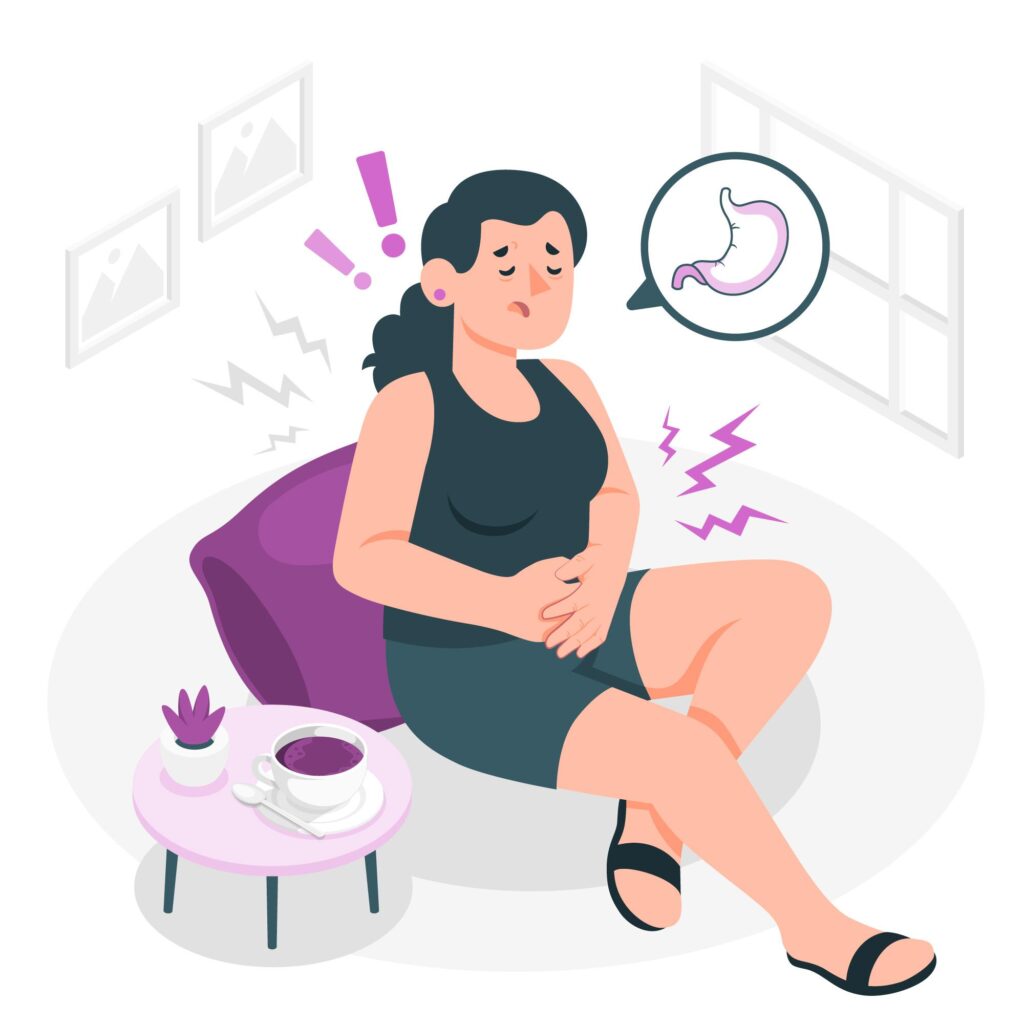Bloating, Let’s know it.
Quick Review:
Symptoms of Bloating:
- Feeling of fullness or tightness in the abdomen
- Abdominal discomfort or pain
- Excessive gas or flatulence
- Abdominal rumbling or gurgling
Prevention:
- Chew food thoroughly and eat slowly
- Avoid gas-producing foods like beans and broccoli
- Limit carbonated drinks and drinking through a straw
- Opt for smaller, more frequent meals
- Stay hydrated and manage stress
Foods to Avoid:
- Gas-producing foods: Beans, broccoli, onions
- Foods that may cause intolerances
Foods to Eat:
- Lean proteins: Chicken, fish, tofu
- Low-FODMAP fruits: Bananas, berries
- Cooked vegetables: Carrots, spinach
- Whole grains in moderation: Brown rice, quinoa
Overview :
Bloating, a common digestive issue, can disrupt daily life and cause discomfort.

What is bloating?
Bloating is a common digestive issue characterized by a feeling of fullness and tightness in the abdomen due to excess gas or trapped air. It can result from various factors like swallowing air, eating gas-producing foods, or digestive disorders.
Causes of Bloating:
1. Excess Gas Production:
Excessive gas production in the digestive tract is a common cause of bloating. This can occur due to:
- Digestion of certain carbohydrates: Foods high in carbohydrates like beans, lentils, and cabbage can produce gas during digestion.
- Swallowed air: Eating or drinking too quickly, chewing gum, or drinking carbonated beverages can result in the ingestion of air, leading to bloating.
2. Digestive Disorders:
Several digestive disorders can contribute to bloating, including:
- Irritable bowel syndrome (IBS): IBS is a chronic condition characterized by abdominal pain, changes in bowel habits, and bloating.
- Small intestinal bacterial overgrowth (SIBO): An overgrowth of bacteria in the small intestine can lead to excessive gas production and bloating.
- Food intolerances: Intolerance to certain foods, such as lactose or gluten, can cause bloating in susceptible individuals.
3. Poor Digestive Function:
Issues with digestion and absorption of food can contribute to bloating. This may include:
- Delayed gastric emptying: Slow movement of food through the digestive tract can result in bloating and discomfort.
- Impaired digestion of certain foods: Inadequate production of digestive enzymes can lead to incomplete digestion of carbohydrates, proteins, and fats, causing bloating.
4. Hormonal Changes:
Hormonal fluctuations, particularly in women, can influence digestion and contribute to bloating. Factors such as menstruation, pregnancy, and menopause can lead to water retention and abdominal distension.
5. Other Factors:
Additional factors that may contribute to bloating include:
- Medications: Certain medications, such as antibiotics, pain relievers, and antacids, can disrupt the balance of bacteria in the gut and lead to bloating.
- Medical conditions: Conditions such as constipation, gastroesophageal reflux disease (GERD), and inflammatory bowel disease (IBD) can exacerbate bloating symptoms.
Symptoms of Bloating:
Common symptoms of bloating include:
- Feeling full or tight in the abdomen
- Abdominal pain or discomfort
- Excessive gas or flatulence
- Abdominal rumbling or gurgling
How to Prevent Bloating?
Preventing bloating involves adopting healthy habits such as:
1. Mindful Eating:
Eating mindfully can help prevent bloating by reducing air swallowing and promoting proper digestion. Consider the following tips:
- Eat slowly and chew food thoroughly to aid digestion and minimize air intake.
- Avoid talking while eating to prevent swallowing excess air.
- Take smaller bites and pause between bites to allow for proper chewing and digestion.
2. Limit Gas-Producing Foods:
Certain foods can contribute to gas production and bloating. To minimize symptoms, consider:
- Avoiding gas-producing foods such as beans, lentils, broccoli, cabbage, and onions.
- Experimenting with a low-FODMAP diet, which limits fermentable carbohydrates that can cause gas and bloating in some individuals.
3. Be Mindful of Beverages:
Carbonated beverages and drinking through a straw can introduce excess air into the digestive tract, leading to bloating. Consider:
- Limiting or avoiding carbonated drinks like soda and sparkling water.
- Drinking beverages from a glass rather than using a straw to reduce air swallowing.
4. Optimize Meal Timing and Portion Sizes:
Timing meals and managing portion sizes can aid digestion and prevent bloating. Try the following strategies:
- Eat smaller, more frequent meals throughout the day to prevent overeating and promote better digestion.
- Avoid large meals late at night, as they can sit in the stomach longer and contribute to bloating.
5. Stay Hydrated:
Proper hydration is essential for digestive health and can help prevent bloating. Consider these tips:
- Drink plenty of water throughout the day to stay hydrated and promote regular bowel movements.
- Limit intake of sugary or caffeinated beverages, as they can contribute to dehydration and worsen bloating.
6. Manage Stress:
Stress can exacerbate digestive issues and contribute to bloating. To promote relaxation and reduce bloating, try:
- Practicing stress-reduction techniques such as deep breathing, meditation, or yoga.
- Engaging in regular physical activity to help alleviate stress and promote digestion.
7. Identify and Manage Food Intolerances:
If you suspect certain foods are causing bloating, consider keeping a food diary to identify triggers and avoid them in the future. Additionally, consult with a healthcare provider to determine if food intolerances or sensitivities may be contributing to your symptoms.
By implementing these preventive strategies, individuals can effectively manage bloating and enjoy improved digestive health and overall well-being.
Foods to Avoid:
Certain foods may exacerbate bloating and should be consumed in moderation or avoided altogether, including:
- Carbonated beverages
- Cruciferous vegetables (e.g., broccoli, cauliflower)
- Legumes (e.g., beans, lentils)
- Dairy products for individuals with lactose intolerance
Foods to Eat:
Choosing foods that are easy to digest and less likely to cause bloating can help alleviate symptoms. Consider including:
- Lean proteins such as chicken, fish, and tofu
- Low-FODMAP fruits like bananas, berries, and citrus fruits
- Cooked vegetables like carrots, zucchini, and spinach
- Whole grains in moderation, such as brown rice and quinoa
Suitable Exercise and Yoga:
Regular physical activity can aid digestion and reduce bloating. Suitable exercises include:
- Walking
- Cycling
- Swimming
- Yoga poses that promote digestion, such as:
- Child’s Pose (Balasana)
- Cat-Cow Stretch (Marjaryasana-Bitilasana)
- Wind-Relieving Pose (Pavanamuktasana)
Complications of Ignorance:
Ignoring bloating and its underlying causes can lead to complications such as:
- Chronic discomfort and reduced quality of life
- Nutrient malabsorption due to impaired digestion
- Exacerbation of underlying digestive disorders like IBS
- Psychological distress and anxiety related to persistent symptoms
Treatment:
Treatment for bloating focuses on addressing underlying causes and managing symptoms. Options may include:
- Over-the-counter medications to relieve gas and bloating
- Dietary modifications to eliminate trigger foods
- Probiotics to promote gut health and reduce bloating
- Prescription medications for underlying digestive disorders
Conclusion:
Bloating is a common digestive issue that can be managed effectively with lifestyle modifications and proper treatment. By understanding its causes, symptoms, and prevention strategies, individuals can alleviate discomfort and improve their overall digestive health. If symptoms persist or worsen, consulting a healthcare provider is recommended for further evaluation and management.


Pingback: Side Effects Of Creatine Supplements - Modern Health
Pingback: Celiac Disease - Gluten Sensitivity, symptoms - Modern HealthMe